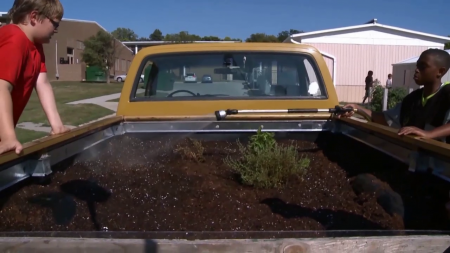Why plant a garden in the bed of a classic truck? One of the reasons, said Monbouquette, is to give people in urban areas a firsthand chance to learn about growing food. During growing season, this garden on wheels can frequently be seen traveling down Omaha roads, parked at community events, or surrounded by children in school parking lots.
“A lot of these kids…haven’t had the opportunity to get dirty,” Monbouquette said. “You feel good that you’re helping to empower them.”
Dan Susman, Omaha Truck Farm’s director, said he and Monbouquette decided to start their truck farm after traveling around the country to shoot a documentary film on urban agriculture and seeing similar efforts in bigger cities.
“We said to ourselves, ‘Hey, there’s not that many opportunities for Omaha-area kids to learn about farming and sustainable agriculture,’” Susman recalled. “So we said, ‘Hey, let’s start something back in our own community.’”
Monbouquette and Susman founded Truck Farm Omaha in the spring of 2012, and the two then brought on Chelsea Taxman as education director. Taxman drives the truck to farmers markets, family-oriented community events, and four local public schools during after-school programs, where she teaches young and old alike about the basics of gardening.
“There’s always some kind of curiosity,” Taxman said. “We get everything from kids thinking we’re crazy -- like, ‘What did you do to your truck!?’ -- to ‘That’s cool,’ to, ‘My dad has a truck. I wonder if he’d let me do that.’”
Once the awe wears off, the students get to dig in.
“We learn about how something is actually growing -- the nutrients in soil, the insects, pollinators, and composting worms.” Taxman said. “We also have harvest activities, so if there’s a lot of basil or arugula, we’ll harvest it out of the truck and show them how to cut the plant without cutting all of it, and then prepare a truck-side snack.”
“Anybody who visits the truck, we encourage them to eat something from the truck,” added Taxman.
This gives the students and visitors an opportunity to learn that there’s more to gardening than work and biological science. Good food and good times quickly become a clear part of the picture.
“Gardening is a lot of fun,” Susman said. “It’s a chance to be active, to sweat a little bit. And at the end of the day, you get some rewards for that labor.”
“We’re not saying that everybody needs to get an old pickup truck to grow some food,” he added. “It’s just trying to get people to think differently about things they see every single day.”
